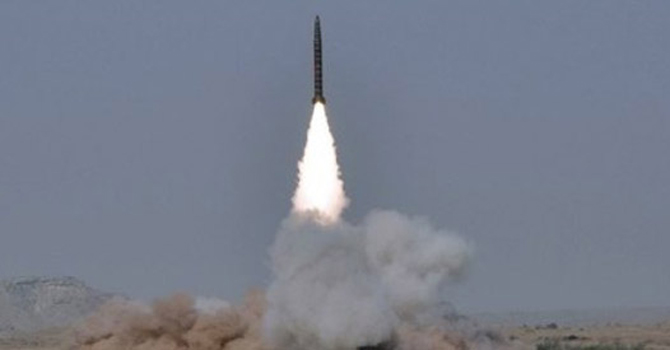
Pakistan could launch a nuclear strike on India within eight seconds, claimed an army general in Islamabad whose warning is described in the latest volume of Alastair Campbell’s diaries.
The general asked Tony Blair’s former communications director to remind India of Pakistan’s nuclear capability amid fears in Islamabad that Delhi was “determined to take them out”.
Britain became so concerned about Pakistan’s threat that Blair’s senior foreign policy adviser, Sir David Manning, later warned in a paper that Pakistan was prepared to “go nuclear”.
The warnings are relayed by Campbell in a section in his latest diaries, “The Burden of Power”. The diaries start on the day of the 9/11 attacks and end with Campbell’s decision to stand down in August 2003 after the Iraq war.
The nuclear warnings came during a visit by Blair to the subcontinent after the 9/11 attacks in 2001. Campbell was told about the eight-second threat over a dinner in Islamabad on October 5, 2001 hosted by Pervez Musharraf, then Pakistan's president.
Campbell writes: “At dinner I was between two five-star generals who spent most of the time listing atrocities for which they held the Indians responsible, killing their own people and trying to blame ‘freedom fighters’. They were pretty convinced that one day there would be a nuclear war because India, despite its vast population and despite being seven times bigger, was unstable and determined to take them out.
“When the time came to leave, the livelier of the two generals asked me to remind the Indians: ‘It takes us eight seconds to get the missiles over,’ then flashed a huge toothy grin.”
Blair visited Pakistan less than a month after the 9/11 attacks as Britain and the US attempted to shore up support in Islamabad before the bombing of Afghanistan, which started on October 7, 2001. Campbell writes that the Pakistani leadership seemed to be keen for Britain and the US to capture Osama bin Laden, though he added it was difficult to be sure.
Relations between Islamabad and Delhi plummeted after the Blair visit when militants attacked the Indian parliament on December 13, 2001, killing seven people. Five of the attackers died.
India blamed Pakistan-based militants for the attack by Lashkar-e-Taiba and Jaish-i-Mohammad groups fighting Indian rule in Kashmir. The tensions became so great that Richard Armitage, the US deputy secretary of state, was sent to the region in May 2002.
Blair returned to the subcontinent in January 2002, shortly after the fall of the Taliban in Afghanistan, amid one of the tensest nuclear standoffs between Indian and Pakistan.
In the preparations for the visit, Manning prepared a paper for Blair that warned of the real threat of a nuclear conflict. In an extract from his diaries for January 4, 2002, Campbell wrote: “DM had a paper, making clear our belief that the Pakistanis would ‘go nuclear’ and if they did, that they wouldn’t be averse to unleashing them on a big scale.
“TB was genuinely alarmed by it and said to David: ‘They wouldn’t really be prepared to go for nuclear weapons over Kashmir would they?’ DM said the problem was there wasn’t a clear understanding of strategy and so situations tended to develop and escalate quickly, and you couldn’t really rule anything out.”
A few days after the visit, the India-Pakistan standoff was discussed by the British war cabinet. In an extract for his diaries on January 10, 2002, Campbell wrote: “CDS (chief of the defence staff Admiral Sir Michael Boyce) said if India and Pakistan go to war, we will be up the creek without a paddle. Geoff (Hoon) said there may have to be limited compulsory call-up of Territorial Army reserves. TB gave a pretty gloomy assessment re India/Pakistan, (and) said (the Indian prime minister Atal Bihari) Vajpayee was really upset at the way (Pakistan’s president) Musharraf treated him. Military dispositions remained the same, with more than a million troops there (in Kashmir). He assessed that the Indians believed that they could absorb 500,000 deaths. Pakistani capability was far greater than the Indians believed.”
Campbell also relays another nuclear threat a year later when George Bush told Blair he feared that Ariel Sharon, the former Israeli prime minister, was planning to launch a nuclear attack against Iraq. In an account of a conversation with Bush at a Nato summit in Prague in November 2002, as diplomatic pressure intensified on Saddam Hussein, Campbell writes:
“(George Bush) felt that if we got rid of Saddam, we could make progress on the Middle East. He reported on some of his discussions with (Ariel) Sharon, and said he had been pretty tough with him.
“Sharon had said that if Iraq hit Israel, their response would ‘escalate’ which he took to mean go nuclear. Bush said he said to him ‘You will not, you will not do that, it would be crazy.’ He said he would keep them under control, adding ‘A nuke on Baghdad, that could be pretty tricky’.”
By Arrangement with The Guardian













































Dear visitor, the comments section is undergoing an overhaul and will return soon.